Rúben Amorim Unveiled: The Man to Take Liverpool Forward?
Liverpool’s quest for Jurgen Klopp’s successor has hit a snag, with Xabi Alonso appearing to be out of the running. The so-far undefeated manager is expected to stay on for another season at Bayer Leverkusen, leaving the door open for a new front-runner at Anfield.
Rúben Amorim, the 39-year-old manager credited with breaking Benfica and Porto’s 19-year stronghold over the Portuguese first division, now emerges as a prime candidate to take the helm.
Rúben Amorim: A Meteoric Rise to Football Fame
Retiring in the same year as Xabi Alonso in 2017, Rúben Amorim hung up his boots at the surprisingly young age of 32. One might think that his playing career was unremarkable, but that would be a mistaken assumption.
Amorim collected 11 trophies during his playing days with Benfica and Braga. He also earned himself a spot in Portugal’s 2014 World Cup squad. While he may not have been the flashiest player on the pitch, his tactical awareness and versatility were undeniable, traits that catapulted him into the coaching world just two years post-retirement.
The Portuguese manager first took charge of Casa Pia in the Portuguese third division in the 2018–19 season. Funnily enough, he was banned for a year after giving out orders on the pitch without having the required coaching badge. Despite the ban being suspended shortly after, Amorim had already resigned from his position.
Yet, 2019 marked a pivotal year for him. Initially taking the reins of Braga’s reserve squad, Amorim quickly ascended to the first team’s head coach position three months later, following Ricardo Sá Pinto’s departure. Within weeks, he clinched his first title, outmanoeuvring Porto in the final of the Taça da Liga, one of the country’s domestic cups.
But Amorim’s narrative didn’t pause there. His stint with Braga, though short at just three months, can only be deemed a success, with only two losses against Rangers in the Europa League’s round of sixteen. In domestic competitions, his record was flawless, with a single draw and 10 victories from 11 matches, including wins over powerhouses Porto, Sporting CP, and Benfica.
This impressive stint at Braga inevitably caught Sporting Lisbon’s eye, leading to his move in March 2020. In the midst of a global pandemic and with Rúben Amorim still relatively new to top-flight management, Sporting invested a staggering €10 million to sign him.
A Winning Bet
Sporting, who failed to win the league since the 2001–02 season, were looking for a manager to bring the glory days back and restore the club’s identity that has been lost for years. Surprisingly, Rúben Amorim did just that.
In his first full season, he led Sporting to win their first league title in nearly two decades, breaking the hold that Benfica and Porto had on the title. He didn’t stop there; in the same season, he also added another Taça da Liga victory to his resume.
In the following campaign, 2021–22, Sporting came in second in the league and won another Taça de Portugal. Even though the season didn’t go as planned, with the team finishing fourth and not picking up any trophies, Amorim has turned things around again this campaign as Sporting is back on top of the league, just a bit ahead of Benfica and well in front of Porto.
Even more impressive is how Rúben Amorim has dealt with big changes over the years. Despite losing key players like Matheus Nunes, Nuno Mendes, João Palhinha, Pedro Porro, and Manuel Ugarte over the last few years, he still kept Sporting in the game, showcasing his adaptability once again.
Tactical Analysis: Out of Possession
Defence Wins You Titles
Amorim consistently employs the 3-4-3 formation in every match this season, valuing its ability to create offensive overloads on the flanks and smoothly shift to a 5-4-1 or a 5-2-3 defensive setup.
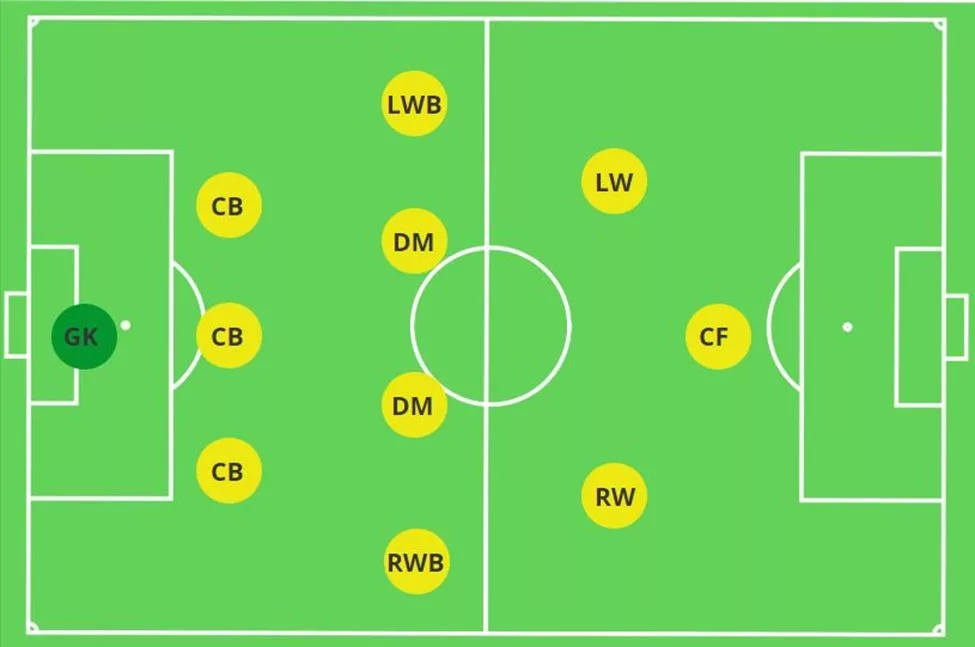
Mirroring their championship-winning campaign, where they were celebrated for having the most robust defence in the league, Sporting continues to be tough to break this season.
Although Sporting is currently ranked as the third-strongest defence in the league, conceding 25 goals, the expected goals allowed (xGA) metric offers a different narrative.
With a low xGA of 19.2, Sporting tops the league, underscoring their effectiveness at drastically reducing their opponents’ scoring opportunities. This defensive prowess is linked to the manager’s preferred 3-4-3 setup. Upon losing possession, Sporting seamlessly transitions to either a 5-4-1 or a 5-2-3 formation.
By adopting a compact and narrow defensive shape, Sporting forces their opponents towards the wings, significantly reducing direct threats to their goal. This approach not only exemplifies the tactical sophistication of their 3-4-3 formation but also emphasises the players’ disciplined commitment to maintaining such a tight defence.
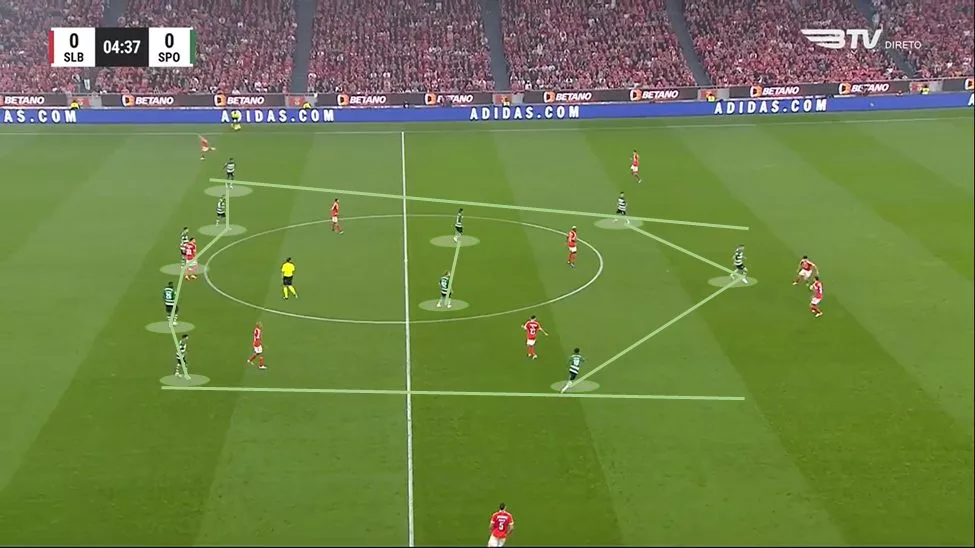
The moment the opponents play the ball to wide areas, Sporting’s players spring into action to aggressively reclaim possession.
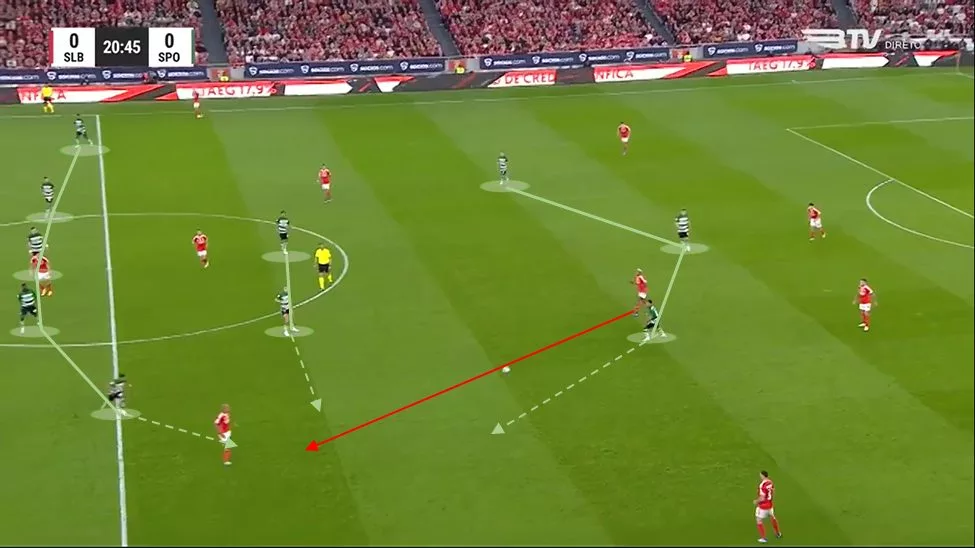
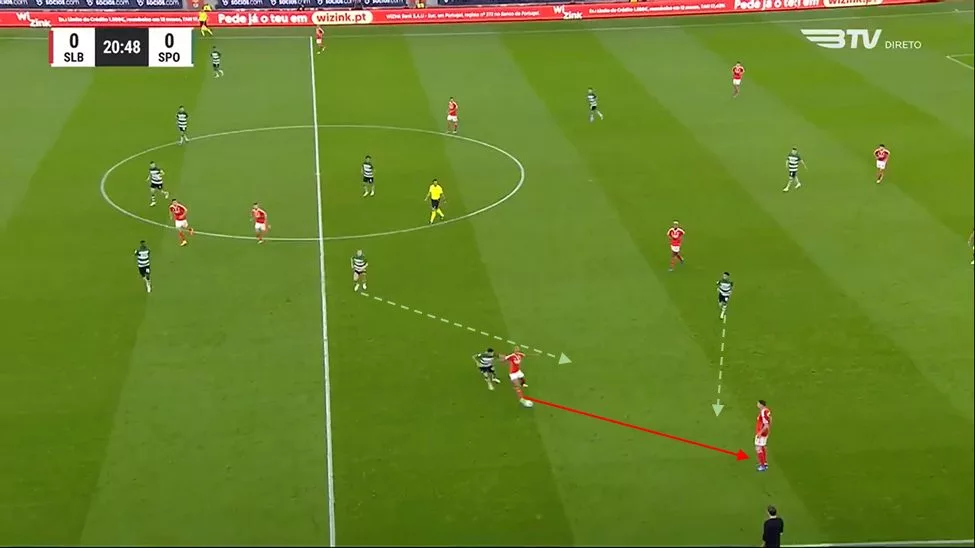
Every team member, forwards included, is required to contribute defensively. This is evident in instances when the first line of the press is bypassed; everyone is tasked with retreating and bolstering the defence, especially on the flanks, to guarantee that the team’s solidity extends throughout the field.
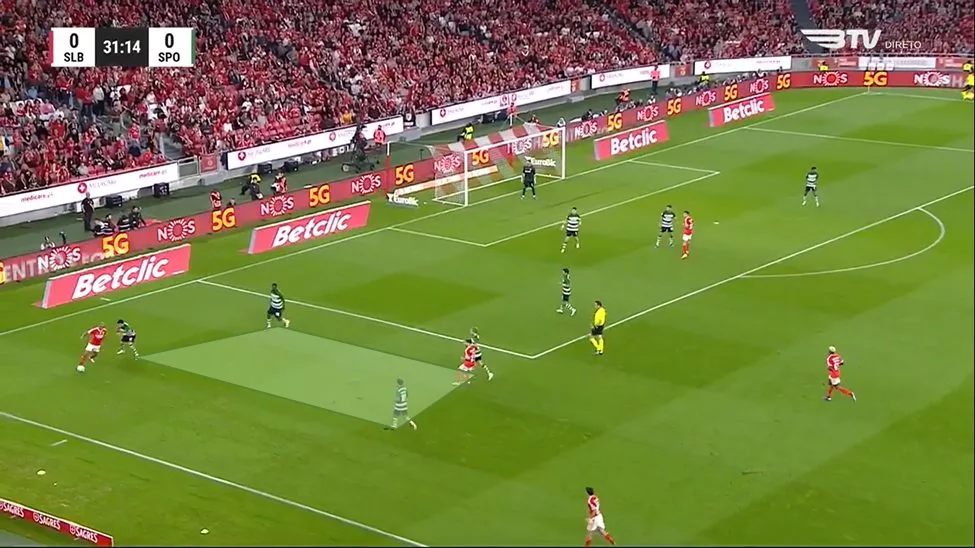
This collective defensive effort underscores the ethos of teamwork and discipline, ensuring Sporting remains a cohesive and formidable unit against any opposition.
By using a five-man defensive line and defending as a unit, one might rush to categorise Amorim as a solely pragmatic, defence-oriented coach, akin to the opposite of Klopp’s philosophy. However, there’s a compelling twist to consider.
In reality, Rúben Amorim and Klopp share a similar thing when it comes to their styles: aggressive pressing.
Rúben Amorim encourages an aggressive, either man-to-man or hybrid, pressing strategy. It’s not uncommon to see his centre-backs pushing up into midfield territories, effectively closing down any room for the opposition’s players to operate. Amorim’s preference for maintaining a high defensive line, which is similar to Klopp’s well-known strategy, supports this tactic.
Amorim’s Sporting showcases a relentless press, irrespective of the adversary, be it a team battling relegation or facing a crucial cup tie against Benfica. For those still doubting, recall the intensity Sporting displayed in their encounter with Arsenal at the Emirates last season.
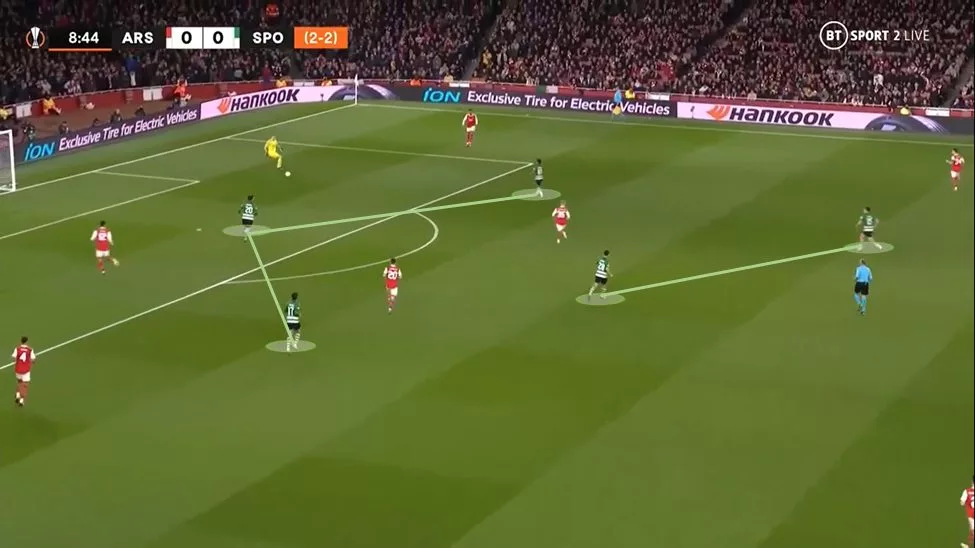
Sporting is averaging 11 PPDA (Passes Per Defensive Action) this season in the Portuguese Primeira Liga, which puts them third. However, intensity isn’t the only key aspect of their pressing. It’s also how efficient it is.
Sporting’s impressive tally of 225 high turnovers, ranking them third in the league, highlights their proficiency in regaining possession. More remarkable, however, is their conversion of these moments into scoring opportunities, with eight goals arising from 41 shot-ending turnovers—the premier rate in Portugal. This epitomises the essence of “Geggenpress.”
In Possession
As Patient as They Come
Now, when it comes to having the ball, Sporting adopts a possession-oriented strategy, averaging 58.5% ball possession in the league.
During their build-up phase, they often opt for the 3-2-5 structure.
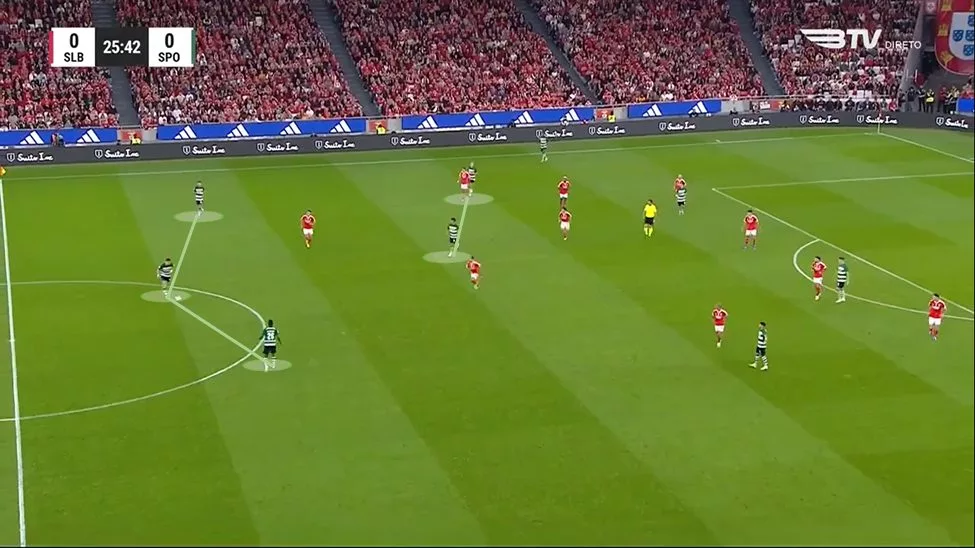
It is safe to say that Amorim’s side likes to take their time during the build-up, circulating the ball among the centre-backs, the double pivot, and even incorporating the goalkeeper as an additional player during this phase.
Their strategy is reflected in their ranking fourth in the league for the number of passes attempted. However, it’s their emphasis on short passes that truly underscores their patience in possession. Sporting has executed 6,403 short passes, boasting a completion rate of 91.1%.
This approach to play is slower and more intricate than that of many other teams in the league, highlighting a distinct focus on maintaining control and meticulously crafting opportunities rather than rushing the play.
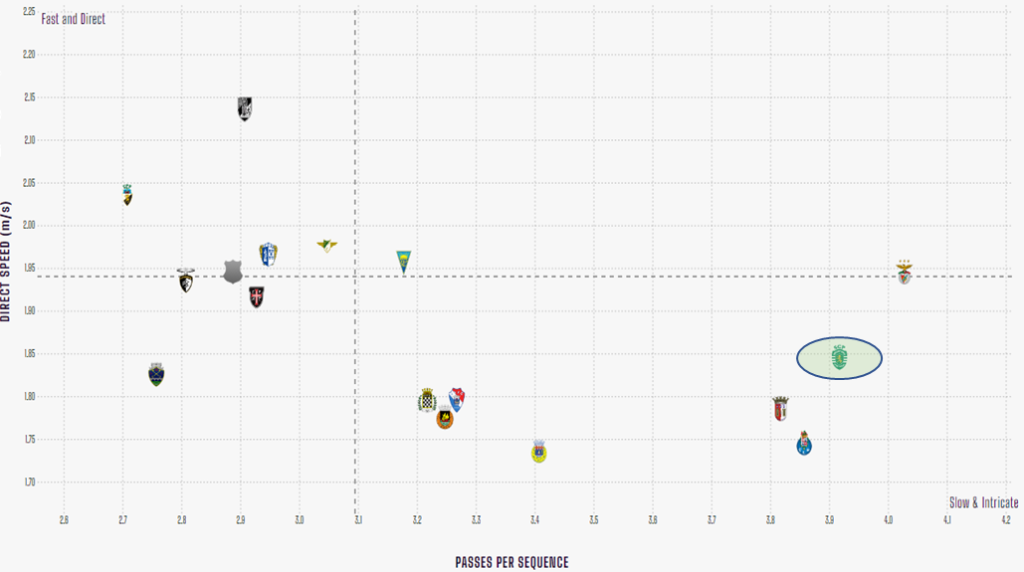
To execute this style of play, you need defenders who are technically proficient. This is where Gonçalo Inácio, the left centre-back, becomes indispensable.
Inácio excels at advancing the ball, capable of doing so through precise passes or by driving forward himself. He stands out in the league, ranked eighth for the most progressive passes with 148 and second for the most yards covered through progressive carries, amassing 3,989 yards.
His exceptional performance has understandably drawn attention from top clubs, with Real Madrid reportedly interested. Speculations abound that should Rúben Amorim move to Anfield, Inácio might be a key addition he seeks, given the Reds’ need for a new left-sided centre-back.
Yet, Inácio isn’t the sole exemplary centre-back at Sporting.
Ousmane Diomande, 20, is stationed as the right centre-back and is equally crucial to Sporting’s build-up phase. Diomande exhibits comfort in receiving the ball even with his back to the goal, offering a dependable outlet for teammates to circulate the ball in their area.
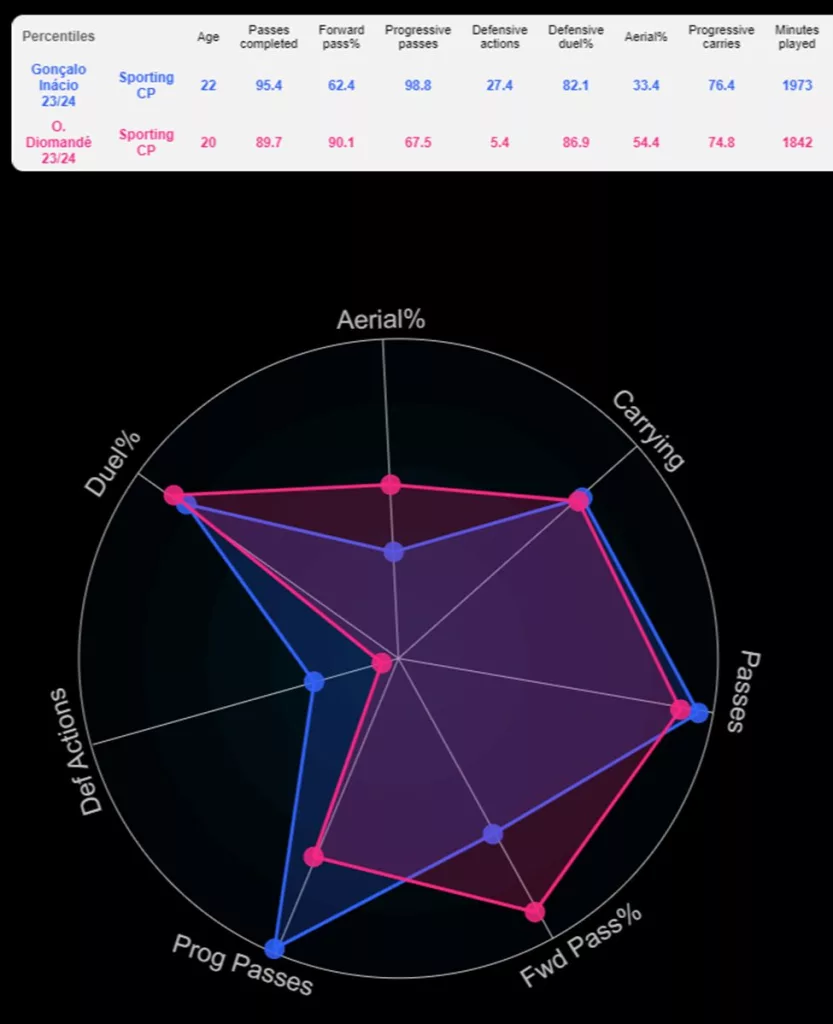
Does this mean that Rúben Amorim aims to bore his opponents by passing the ball around in order to create chances? Absolutely not.
While the defence orchestrates the ball’s movement, the attacking unit, comprising the front five, expansively occupies every available space upfront.
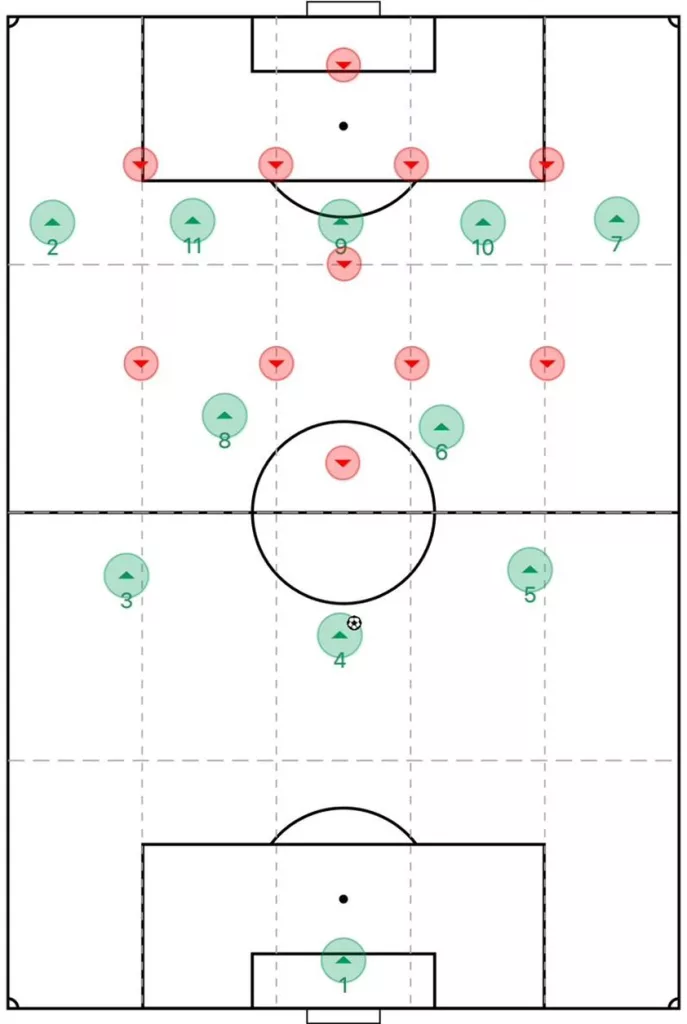
This dynamic ensures that the double pivot can engage in the buildup while Sporting’s defenders continuously search for those line-breaking passes that can dissect the opposition’s defensive setup. The five-man frontline occupies the opponents’ backline.
Meanwhile, Viktor Gyökeres is tasked with running the channels, further destabilising the opposition’s back line and opening gaps for the defenders and midfielders to progress the ball through.
These deliveries into the half-spaces are crucial for penetrating the opponent’s defence and setting the forwards up in central areas, where Sporting takes the majority of their shots.

It might appear that Sporting’s offensive approach heavily relies on its centre backs, suggesting that the absence of even one could jeopardise the entire strategy. However, this assumption misses the mark.
The consistency observed in Sporting’s gameplay is proof of detailed, precise coaching, with constant tweaks made to ensure the build-up play remains efficient. An exemplary instance of this was during Diomande’s absence due to the AFCON last January, when Sporting continued to excel in the league.
Chameleonic Approach When Needed
Amorim’s adaptability is not limited to player management but extends to his tactical approaches. When opponents apply high pressure, thereby complicating build-up play from the back, Amorim is quick to adapt, favouring long balls aimed at his forwards.
Once again, Victor Gyökeres stands out in this scenario, embodying the ideal Amorim striker with strength, speed, and aerial prowess.
The Sweden international not only excels in retaining possession and dropping back when necessary but also finds gaps in the half-spaces, providing a lethal outlet during transitions. This sparks speculation about players like Darwin Nunez potentially fitting into this role in the future.
Sporting’s offensive record is remarkable, boasting the best attack in the league with 75 goals scored from an expected goal (xG) of 55.2. A notable contributor to this overperformance is, once again, Gyökeres, with 22 league goals to his name. His overall contribution of more than 50 goals this season is another proof of Amorim’s knack for spotting and developing talent.
Rúben Amorim: A Trait Beyond Numbers
This takes us to another key point of Amorim’s success: his exceptional player management.
Rúben Amorim is celebrated throughout Portugal not just for his tactical acumen but for his magnetic leadership qualities. However, what truly distinguishes the Portuguese is his communication skills. He has a unique ability to connect with each individual on a personal level, tailoring his approach to suit their specific needs.
“Ruben is a coach that brings everyone together. From the players, administration, staff, everyone ‘buys into’ your idea. This is key to creating a winning mindset. He has a very strong personality but, at the same time, it does not fracture the group. With his strong leadership, he manages to unite and aggregate. He is very smart in human relationships and communication. These are Ruben’s strengths as a coach”
His superpower is not the 3-4-3, it is communication. With the media, the fans and the players.
– Paulo Meneses: Braga’s Head of Recruitment
Rúben Amorim’s meteoric rise in the managerial world was not accidental. He already proved his ability to adapt to change over the course of his four years with Sporting and his tactical and man-management qualities are there for everyone to see.
Still, a big question hangs in the air. Will Rúben Amorim reshape the Liverpool squad to align with his philosophy, or will he once again adjust his approach based on the resources at hand?


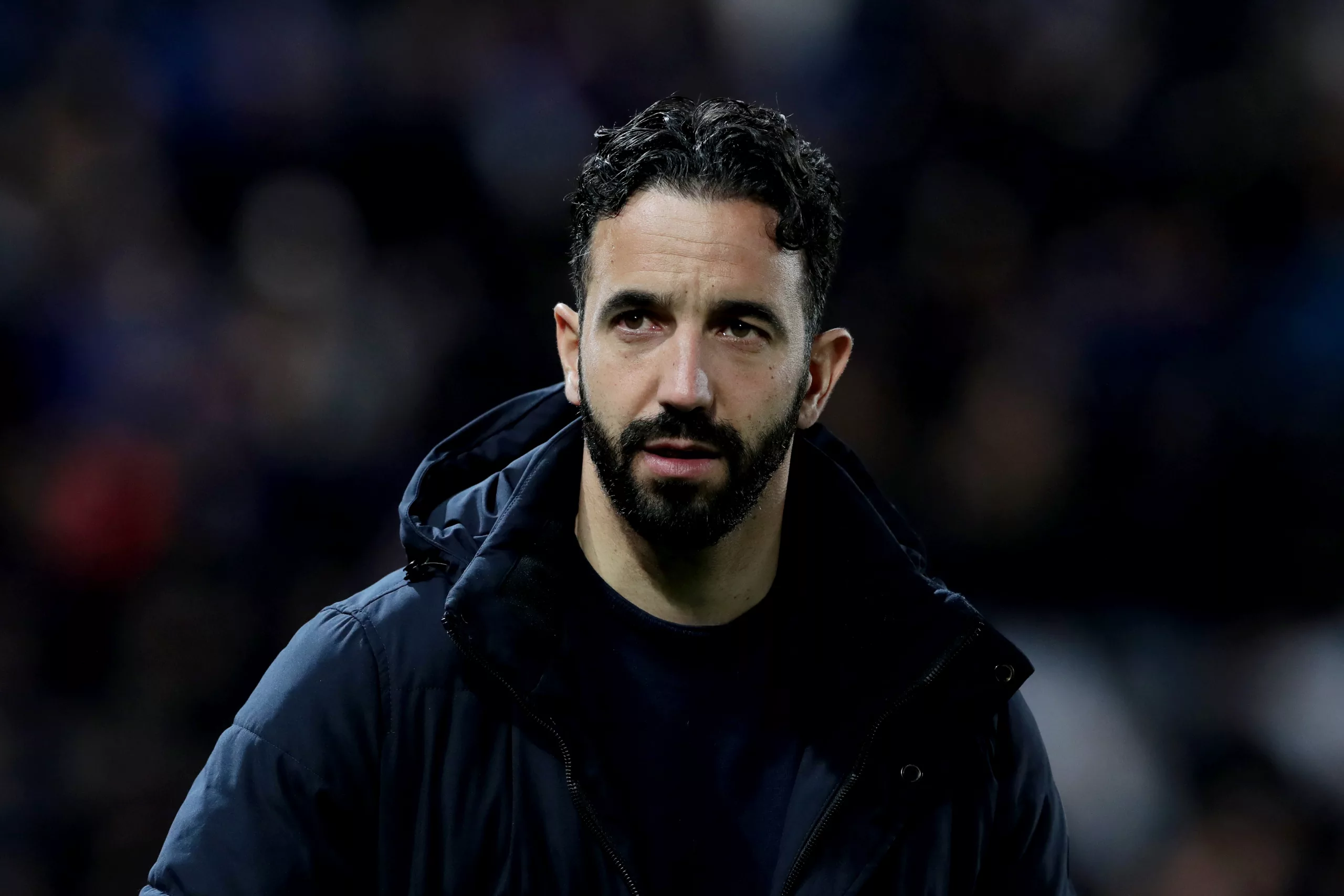
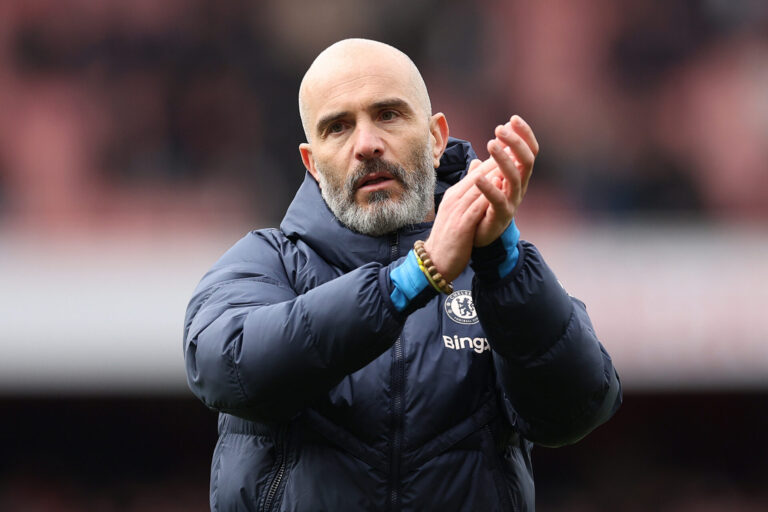
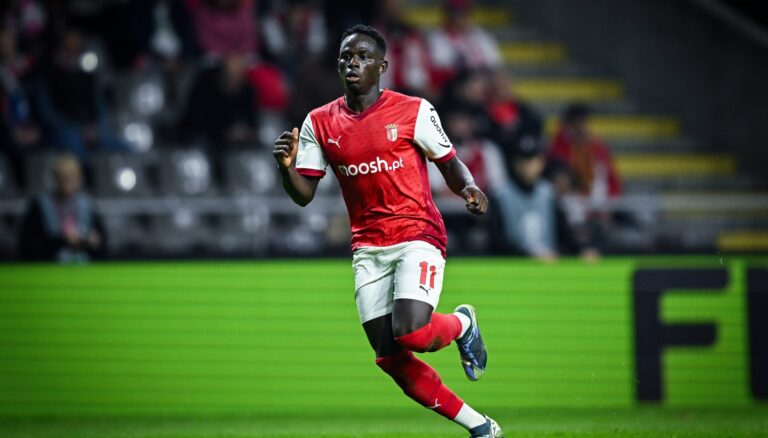
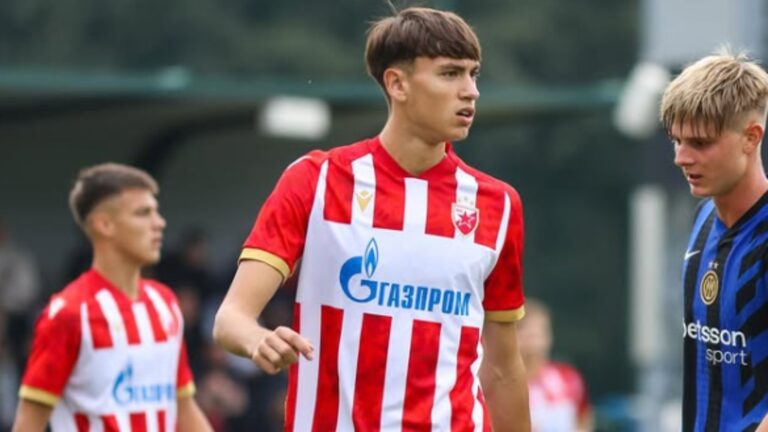
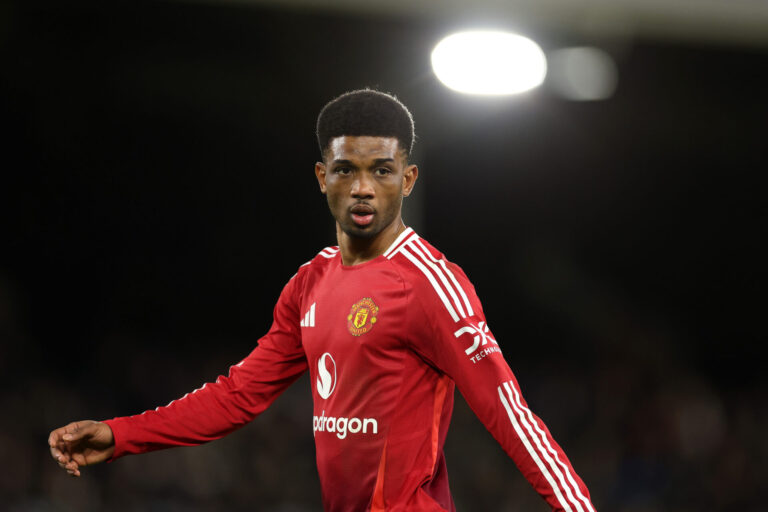
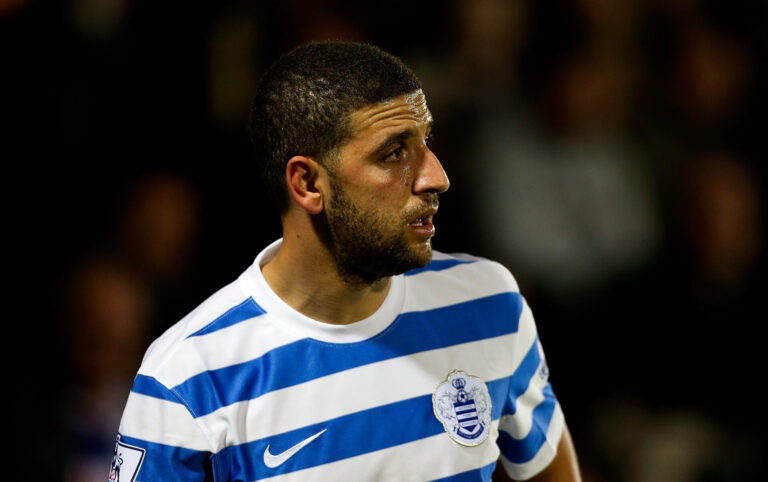
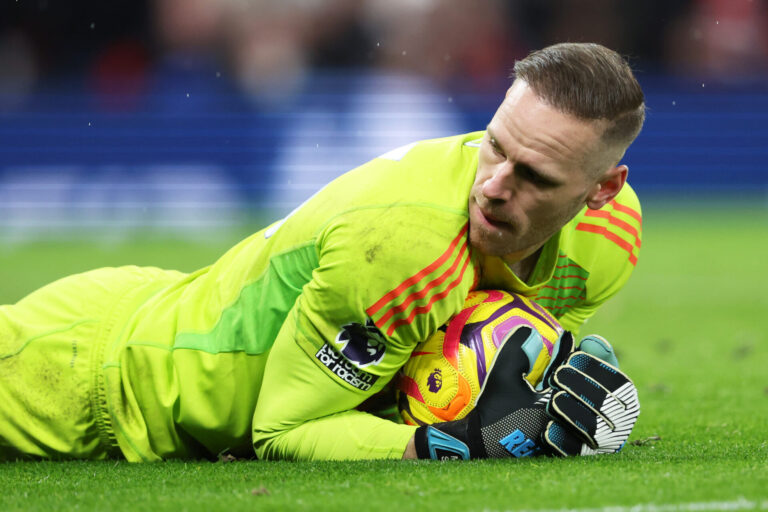
3 Comments